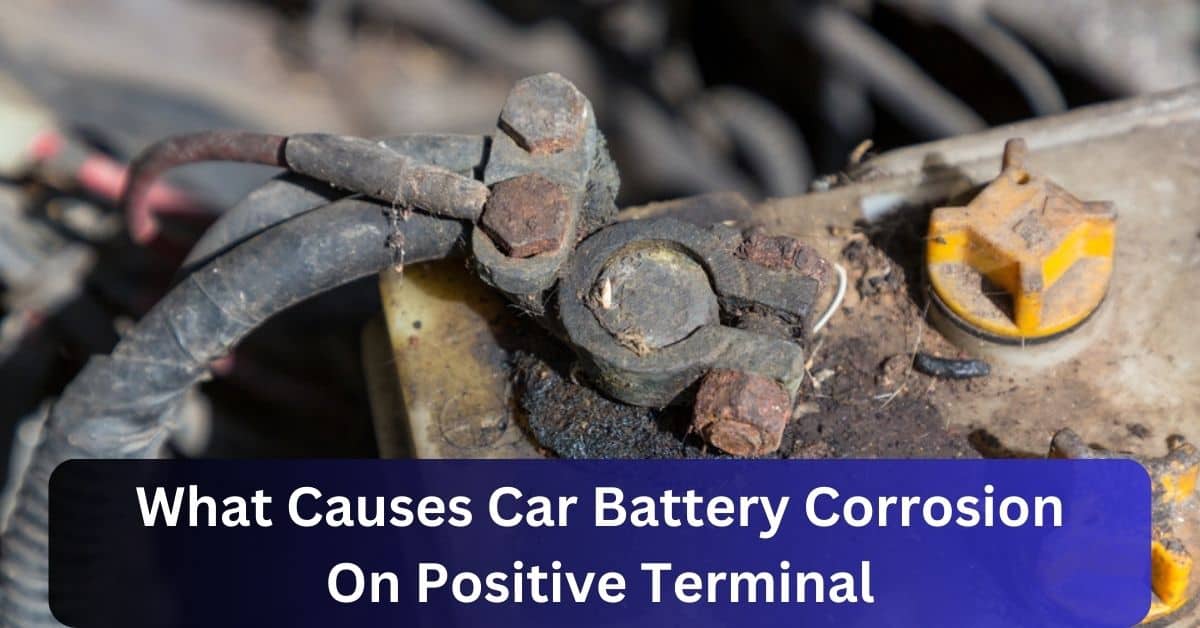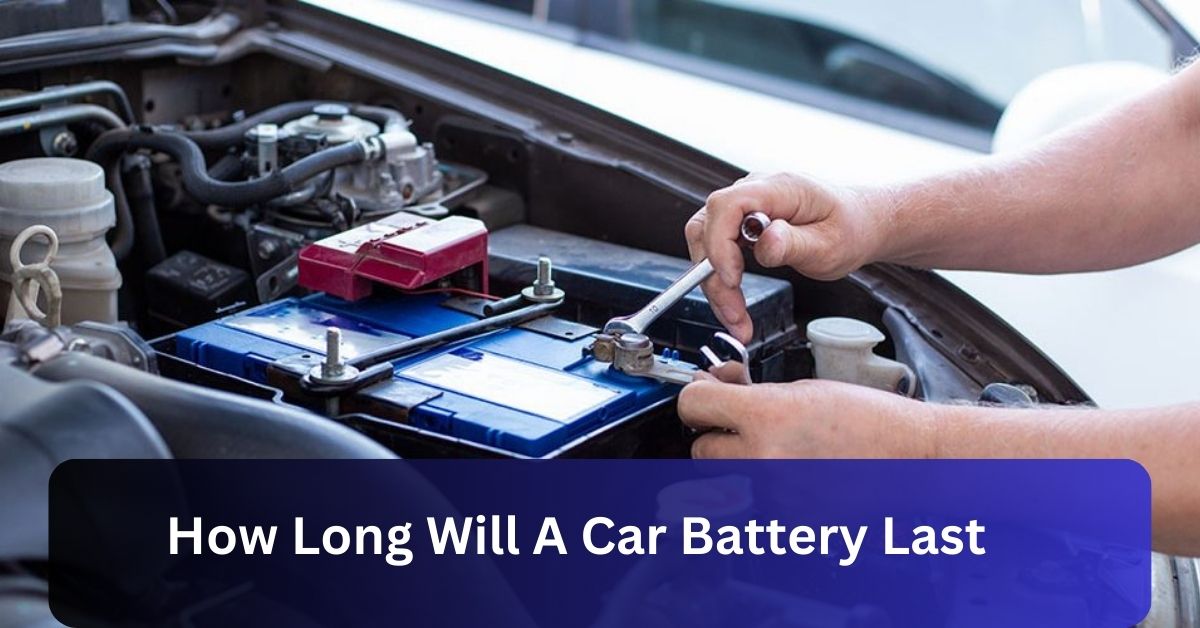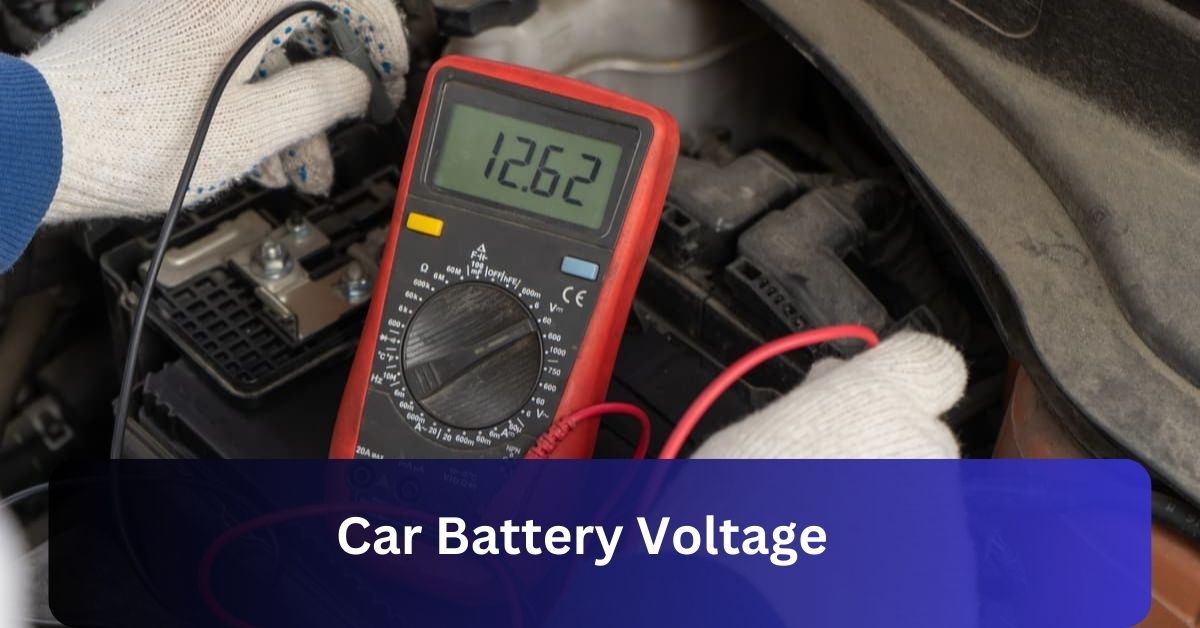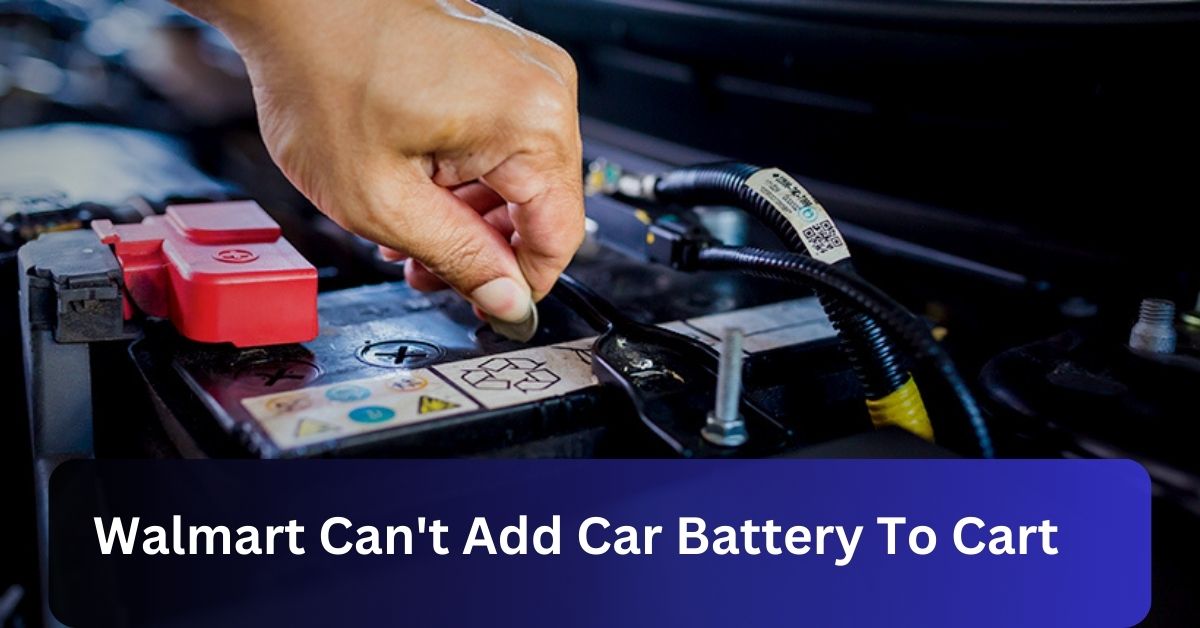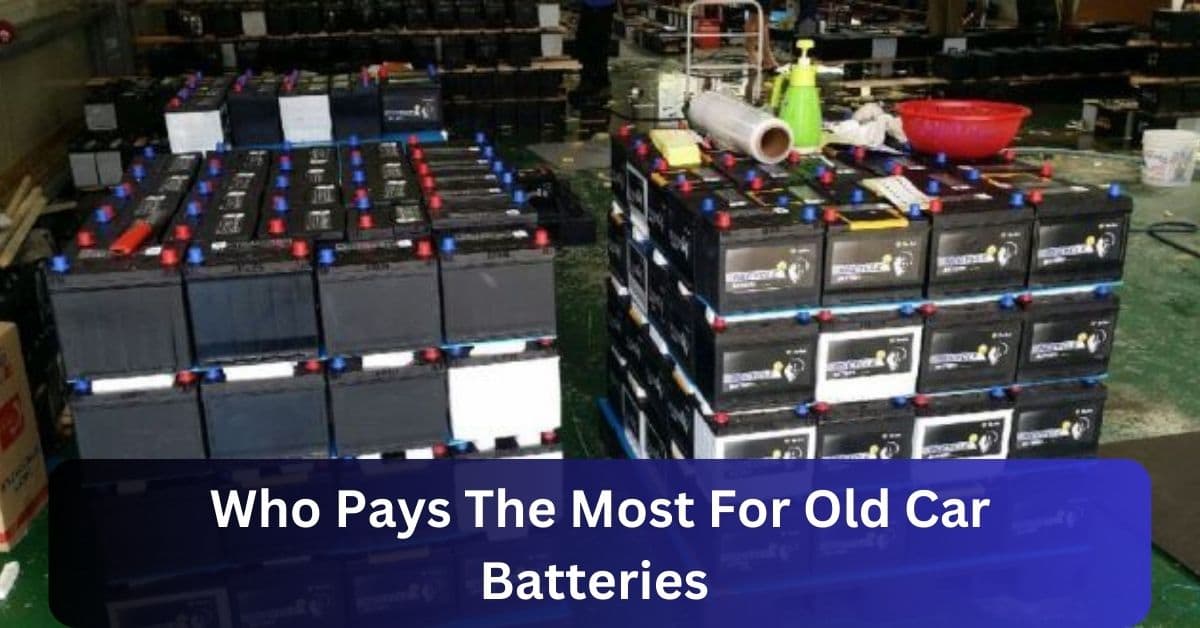Car battery corrosion on the positive terminal is primarily caused by electrolyte leakage, overcharging, and chemical reactions. These factors lead to acidic buildup, damaging the terminal and reducing battery efficiency.
In this post, we’ll explore what causes terminal corrosion and how it affects your vehicle’s performance. We’ll also guide you step-by-step on how to clean and prevent corrosion, plus discuss the advantages of switching to lithium batteries for a hassle-free experience.
What Is Battery Corrosion?
Corrosion occurs when hydrogen gas from your battery mixes with air, moisture, and salt, creating a chemical reaction.
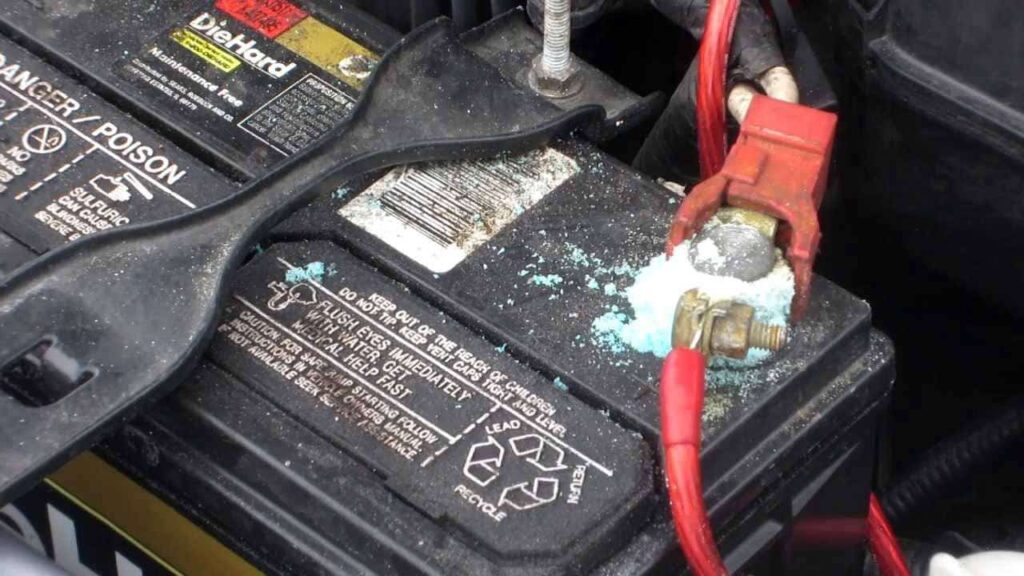
This reaction creates a white, blue, or green powder around the battery terminals, posts, or cables. The powder has a gritty, granular texture and is easy to spot, often indicating that your battery needs attention.
What Causes Battery Corrosion?
Overfilled Batteries:
They cause corrosion because excess electrolytes can leak out when the battery is overfilled. This leakage reacts with the metal terminals, creating a white or bluish powdery buildup.
Damaged or Leaking Batteries:
Damaged or leaking batteries cause corrosion by allowing acid to escape and react with the surrounding metal parts. This results in a white, blue, or greenish powder forming on the battery terminals.
Overcharging and High Temperature:
The high temperatures can lead to battery corrosion. When a battery is overcharged, it produces excess hydrogen gas, which reacts with the air and creates a corrosive buildup. High temperatures speed up this reaction, causing more corrosion.
Read Also: Battery Died Now Gauges Not Working – What You Need to Know!
How to Prevent Battery Terminal Corrosion?
Chemical Reactions Behind Corrosion:
Battery terminal corrosion happens due to chemical reactions between battery acid, hydrogen gas, and the air. To prevent this, use protective sprays or coatings on the terminals.
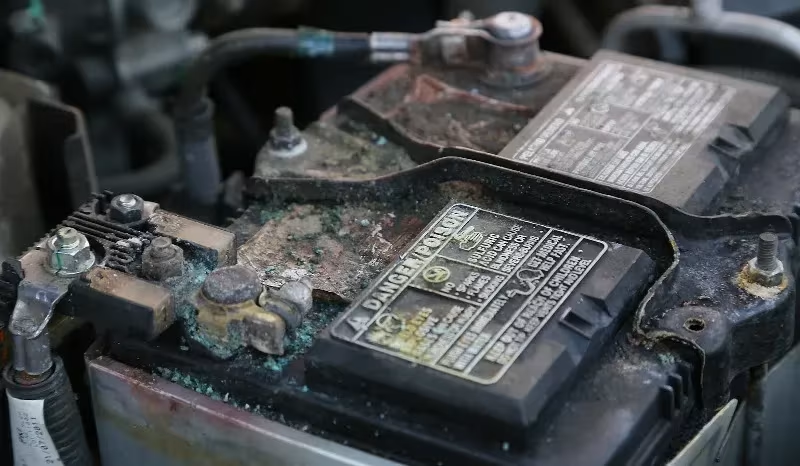
Properly clean the terminals with a mixture of baking soda and water to neutralize acids and stop corrosion from forming.
Effects of Corroded Terminals:
Corroded batteries can cause poor electrical connections, leading to starting problems and dim lights. It can also shorten the battery’s life and make it work less efficiently.
Regularly cleaning and maintaining terminals helps prevent these issues and keeps your vehicle running smoothly.
Step-by-Step Guide on How to Clean Corrosion on Battery Terminal
Disconnect the Battery:
They involve removing the cables from the battery terminals to prevent electrical issues or accidents while working on it.
Always disconnect the negative terminal first, and then the positive one. This safety step helps avoid short circuits and keeps you safe during maintenance or repairs.
Clean Corroded Battery Terminals Using Baking Soda and Water Mixture:
To clean the corroded battery, mix baking soda with water to make a paste. Apply the paste to the corroded areas, then scrub gently with a brush. Rinse with clean water and dry thoroughly. This helps remove corrosion and restore good electrical contact.
Scrub with a Wire Brush:
Use a wire brush to scrub away the corrosion brush the terminals and connectors to remove the buildup. This helps improve the electrical connection and prevents future issues. Always make sure the battery is disconnected before you clean it.
Read Also: Will AGM Batteries Work in Older Cars – Complete Details!
How to Prevent and Keep Battery Terminals from Corroding?
Regular Maintenance and Inspection:
Check the battery terminals for signs of corrosion and clean them if needed. Ensure the battery is securely connected and free from leaks. Regularly checking and cleaning the battery helps it last longer and keeps your vehicle running well.
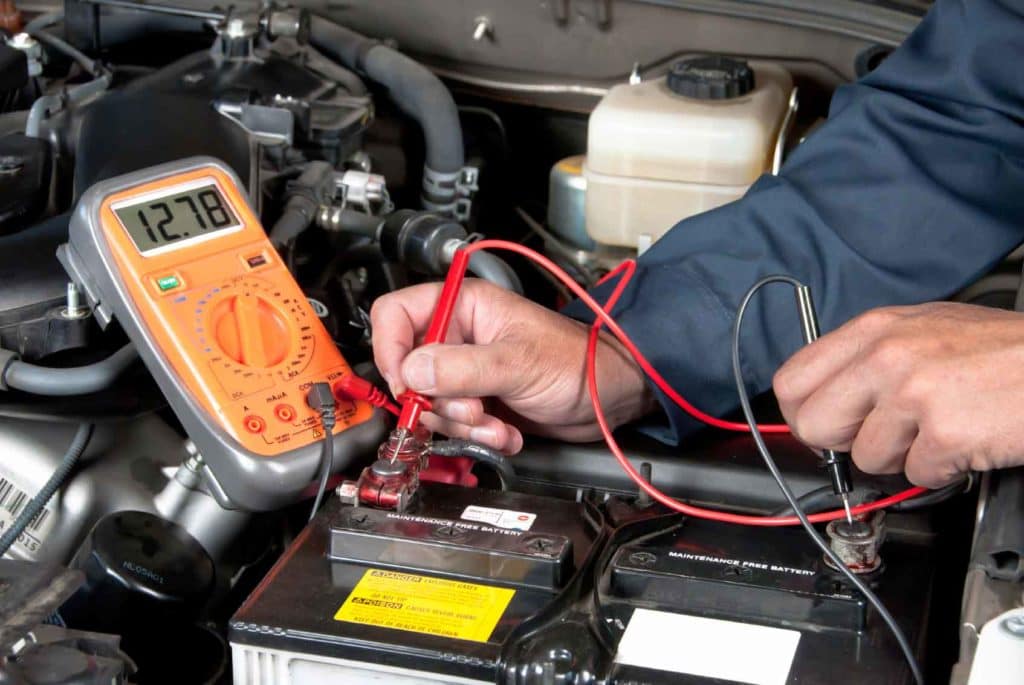
Protective Coating and Dielectric Grease:
Using protective coating and dielectric grease on battery terminals helps prevent corrosion. Apply a thin layer of dielectric grease to the terminals to shield them from moisture and acid.
Protective coatings also create a barrier against corrosion, helping to keep the battery extend its life.
Proper Charging Practices:
Avoid overcharging by using a charger that matches your battery’s specifications. Regularly check the battery’s charge level and ensure the charging system works correctly.
This prevents overheating and excess gas production, reducing the risk of corrosion.
The Benefits of Switching to Lithium Batteries
No Acid Leaks or Fumes:
To avoid battery problems, ensure there are no acid leaks or fumes. Check the battery regularly for any signs of leakage or unusual smells.
If you spot leaks or fumes, address them immediately to prevent corrosion and damage. Keeping the battery sealed and in good condition helps it work better and last longer.
Maintenance-Free Operation:
Using advanced designs, such batteries don’t need regular checks or water refills. They are sealed to prevent leaks and corrosion, making them easy to use.

Frequently Asked Questions:
1. What makes battery terminals corrode?
The battery terminals corrode due to chemical reactions from leaking acid, overcharging, or high temperatures. These factors cause acid and gas to react with the metal terminals, forming a white or blue powdery substance and affecting battery performance.
2. Does corrosion mean I need a new battery?
Battery corrosion is common and can lead to shorter battery life and electrical issues. Cleaning the terminals can help, but if there’s too much corrosion or trouble starting your vehicle, it might be time to replace the battery.
3. Can a corroded battery terminal be fixed?
Yes, you can fix a corroded battery terminal by cleaning it. Remove the terminals and scrub them with a wire brush. Use a baking soda and water mix or a battery cleaner to neutralize any acid.
4. How do you keep battery terminals from corroding?
To prevent battery terminal corrosion, clean them regularly and use terminal protectors. Using dielectric grease keeps the connection tight and stops corrosion. These steps help extend the life of the terminals and keep your battery functioning properly.
5. Does battery corrosion mean you need a new battery?
Battery corrosion doesn’t always mean you need a new battery. Corrosion often causes issues like poor connections and reduced battery life. Cleaning the terminals and addressing any problems can often fix it.
Conclusion:
In conclusion, Battery terminal corrosion can affect your vehicle’s performance and battery life. Understanding its causes and using proper cleaning and prevention methods helps keep your battery in good shape.
Switching to lithium batteries offers benefits like no leaks and less maintenance, ensuring a more reliable and hassle-free driving experience.

